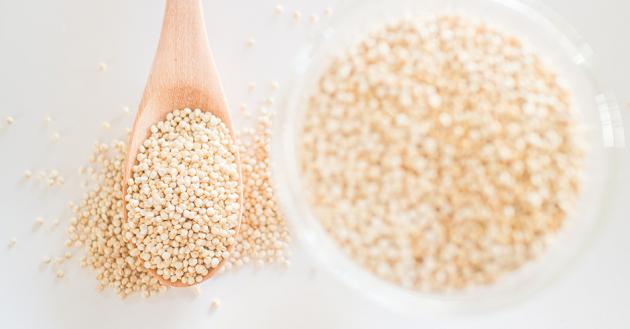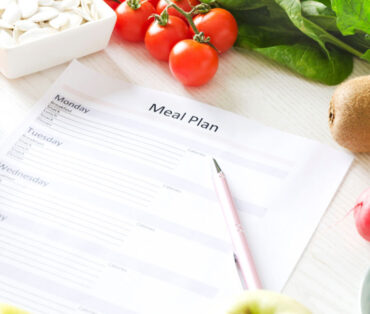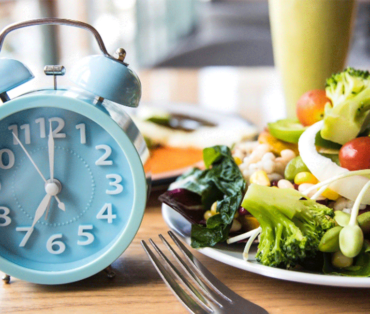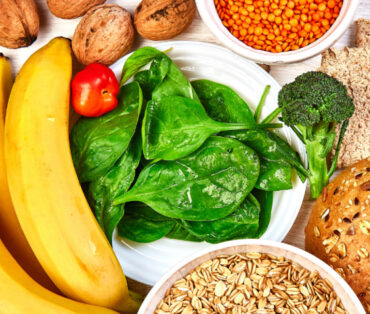Help Build Lean Muscle with Heart Healthy Proteins
Your hair and nails are made of protein, your body repairs and builds tissues with protein, and protein is a critical component in bones, blood, muscles, and hormones. Protein is a powerful “macronutrient” that provides the building blocks of muscle—lean, calorie-burning muscle that enables you to do everything you do, from going up and down stairs, to cruising the Curves Circuit, to participating in your local 5K for heart disease.
Protein is also an essential part of a weight loss eating plan and it’s popping up everywhere these days, everywhere from bars and shakes to cereals and bread. You can even get protein-fortified water these days! As protein comes in all shapes, tastes, and textures, including meat, poultry, fish, eggs, beans, nuts, dairy, and even grains, it’s super easy to find. Here’s how to understand your protein intake requirements and sort through the options to choose the ones that build lean muscle and good health.
How much protein do you need?
Unlike fat and carbohydrates, our bodies don’t store protein, but that doesn’t mean you should fill your plate with steak three times a day. Adequate protein is needed to build muscle – that’s why elite athletes need to eat more. For the average woman, the CDC says 46 grams of protein (or about 10% to 35% of your daily calorie intake), which is a glass of milk at breakfast, a cup of yogurt at lunch, and a 3 -ounce serving of meat at dinner. Keep in mind, a 3 ounce serving of meat is about the size and thickness of a deck of cards.
Not All Proteins Are Created Equal
The amino acids that make up protein are what your body uses to build muscle and other tissue. Scientists have identified 20 amino acids that you need, and of those, your body can synthesize all but nine. These nine are called essential amino acids, and you must get them from food. A protein that contains all of the essential amino acids is called a complete protein.
Animal foods (meat, poultry, fish, eggs, and dairy products) all deliver complete proteins, providing all the essential amino acids. That may be great when it comes to building muscle, but all animal products also come with saturated fat, which is not so great for heart health. Saturated fat from food raises blood levels of cholesterol and triglycerides.
Plant proteins such as beans, edamame (soybeans), and certain grains generally are not sources of complete protein, but they are very low in saturated fat and stay that way if you prepare them in a heart-healthy manner.
“While complete proteins might seem ideal, because they provide all amino acids, they usually are from animal sources which can be higher in saturated fats than incomplete proteins,” says Courtney Lambrow, nutritionist for Curves. “For this reason, it is important to consume a combination of both and to focus on the leanest choices.”
The Best Heart-Healthy Options
From the traditional, old-fashioned king of protein—steak—to fish to beans to grains, there are plenty of lean proteins to help you build lean muscle and a healthy heart. So, whether you’re a meat or veggie lover, there are plenty of good proteins to choose from.
When it comes to eating meat, stick to the leanest cuts (leg, loin and round) and always remove skin from chicken before cooking, since saturated fat lurks in the skin. It’s okay to cook the chicken with the skin to retain its moisture, and simply remove afterward to shave off a little extra saturated fat. Shy away from processed meats, like hot dogs, deli ham, turkey, pastrami, and bacon, to avoid unwanted calories, sodium, and preservatives. Among the animal proteins, the American Heart Association recommends these low-saturated-fat options:
- Fish and shellfish
- Poultry minus the skin (choose breast meat over higher-fat legs and wings)
- Lean beef (round, sirloin, chuck, or loin; choose “choice” or “select” grades over “prime”)
- Lean ground beef with no more than 10% calories from fat
- Lean pork (tenderloin or loin chop)
- Lean cuts of bison
- Wild game such as venison, rabbit, pheasant, or wild duck, which are lower in fat than animals raised for market (duck or goose).
It’s important to get your protein intake from a wide range of sources, and not just proteins from meat. To pump your protein intake, be sure to also include:
- Beans and legumes
- Eggs
- Nuts
- Soy
- Low-fat dairy products, such as yogurt, milk, and cheese, fight the onset of osteoporosis because they are rich in calcium and vitamin D.
Beans and eggs are some of the least expensive ways to include protein in your diet. Eggs provide high-quality protein—one that is complete and is easily digested and used by your body. One large hard-boiled egg contains 78 calories, 6 grams of protein, and only 1.6 grams of saturated fat. Though eggs are high in cholesterol, studies show that eating them does not raise blood cholesterol levels in most people. Plus, beans are fat-free and loaded with fiber, the latter is what helps you feel satiated longer.
Do you remember when cottage cheese seemed to be one of the staples of dieters everywhere? Well, there’s a good reason. A half-cup serving of low-fat, 1 percent cottage cheese has only 81 calories, 1 gram of saturated fat, and a whopping 14 grams of muscle-building (and hunger-satisfying) protein.
Greek yogurt is another great choice that lends itself perfectly to busy schedules in need of on-the-go meals. One 6-ounce container of plain, nonfat yogurt contains 100 calories, 17 grams of protein, and no saturated fat. Perfect for a quick-and-easy breakfast with a banana and a tablespoon of almonds in the morning.
Consider mixing some cooked grains and maybe a touch of honey into that Greek yogurt. Balancing animal foods with plant foods that are rich in protein not only reduces saturated fat in your diet, it helps you add in a wide range of vitamins, minerals, fiber, and other nutrients that are abundant in these foods. Beans, soy, and tofu come to mind when we think about vegetarian sources of foods but most grains, especially whole grains, are also a good source of protein.
Quinoa and amaranth, two “ancient grains” that have gained popularity in recent years contain complete protein. A ¾ to 1-cup serving of cooked amaranth or quinoa delivers roughly 6 grams of protein and 166 calories.
Protein shakes are another option and can offer 15 grams of protein per serving and come in a variety of delicious flavors (such as chocolate and vanilla). This perfect post-workout drink will help with muscle repair and recovery. Find some of our favorite protein shake recipes at the bottom of this article.
Ways to Pump Up Your Protein
Now that you know why protein is so important and the best animal and non-animal proteins to include in your diet, here are six tips to further help you pump up your protein and reap the benefits:
1. Focus on the essentials
A complete protein source is one that contains all nine essential amino acids to support human dietary requirements. Not only does a complete protein contain all the essential amino acids, but it also contains them in perfect proportion in terms of biological function. As you read above, there are many heart-healthy proteins to include in a weight loss meal plan for women, such as low-fat dairy, lean meat and quinoa.
2. Stay consistent
The amount of protein you consume as part of a healthy diet can vary, depending on your overall health and activity level. More importantly, don’t forget to eat a steady amount of protein throughout the day, instead of loading up on it at dinner each night. It’s best to eat a variety of protein sources, for example, eggs for breakfast, chicken breast for lunch, and a quinoa salad for dinner. And don’t overlook those perfect for ‘on-the-go’ protein sources, like Greek yogurt and protein bars and shakes.
3. Read labels: Even on fresh meat
You may be an avid label reader when it comes to your granola bars and yogurt, but it is equally as important to read the label on your “fresh” protein sources as part of a healthy eating plan. Purchasing your chicken or fish from the refrigerated section of the grocery store does not necessarily mean you made a better choice. If the ingredient list on your protein source contains words other than the actual food source, i.e. “chicken” or “fish,” search for a different brand. What’s more, watch out for additives such as artificial colors, high fructose corn syrup, MSG or nitrates, because they indicate the meat has been processed.
4. Realize animal proteins are the most ‘bioavailable’
Proteins consumed from animal-based foods are the most easily harnessed and used by your body. That’s why they make such good gym foods! For instance, 20 grams of protein from egg whites delivers more of a protein punch than the same quantity of protein from plant sources. You can still get the protein you need from non-animal sources; however, protein from animal sources is absorbed more readily by your body. Having a varied diet that incorporates plenty of plant-based protein and low-fat dairy in addition to lean animal protein is a great way to incorporate varied sources of protein into your weight loss diet.
5. Try unique sources of protein
Everyone is familiar with basic protein sources, such as beef, chicken, and fish, but there are many other great options for incorporating protein into healthy meal plans. These include dried beans and peas, tofu, quinoa, nuts and nut butters, seeds and Greek yogurt.
6. Use protein to help ‘get your burn’
Protein is thermogenic; this means that it creates a slight calorie burn as it’s digested. When compared to many carbohydrate-rich foods, protein has a greater thermogenic effect. It’s like giving your digestive system a good, hard run. Eat protein as a post-workout food, and you can extend your calorie burning even longer!
Busy schedule? Here are 14 protein-packed breakfasts to eat on the go!
For the mornings that you’re running a little late and can’t sit down to a veggie omelet or warm oatmeal with nuts and berries, you might be tempted to pick up something at a fast-food drive-through, but many of those on-the-go breakfasts are high in sodium and fat.
To get your day off to a good start, we offer some grab-and-go meal suggestions that will power up your morning with carbs, fiber, and protein. There’s no continental breakfast here. A high-carb start to the morning might deliver a rush of energy, but within a couple of hours, you’ll come crashing down along with your blood sugar levels. Adding protein to your meal slows the release of glucose for steady energy, mental focus, and satiety. Protein helps keep you satisfied so you don’t devour the donuts in the break room at the office. You’ll be better able to control your cravings and your weight.
A protein-packed meal is the true breakfast of champions, and here’s why: your body is busy all day long repairing and building muscle, especially if you are active at Curves three or four times a week. By including protein in every meal throughout the day, you supply your body with the material it needs for optimal muscle maintenance. Here are 14 delicious, protein-rich breakfasts that you can enjoy at the table or on the road:
1. Chocolate Cinnamon Spice Protein Shake
This protein shake recipe is super easy and delicious! In a blender, place 2 scoops of chocolate protein powder, 1 cup of low-fat milk (1 %), 1 tablespoon of sugar-free chocolate pudding mix, 5 ice cubes, ¼ teaspoon of cinnamon, and 1/8 teaspoon of nutmeg. Blend until smooth. Enjoy with 8 almonds on the side.
2. Caramel Cappuccino Protein Shake
Another super easy and delicious protein shake recipe that’s perfect for on-the-go breakfasts, our Caramel Cappuccino Protein Shake combines your morning cup of coffee with Chocolate Protein Shake Mix, non-fat milk and caramel extract.
3. Nutty Coconut Protein Shake Recipe
Indulge your sweet tooth and reward yourself with this healthy and delicious nutty coconut shake packed with protein! Our Nutty Coconut Protein Shake Recipe combines vanilla protein shake powder, low-fat milk, vanilla coconut milk, sugar free vanilla pudding powder, coconut extract, shredded dried coconut and whole almonds with ice cubes for the perfect summer protein shake!
4. Berry Blast Protein Shake
One of our most popular protein shake recipes, our Berry Blast Protein Shake is packed with protein and includes plenty of blueberries, raspberries and strawberries which are high in nutrients, vitamins and antioxidants. Just blend all the ingredients and enjoy!
5. That’s a Date Breakfast Smoothie
Indulge your sweet tooth and reward yourself with a healthy and delicious breakfast shake recipe, our That’s a Date Breakfast Smoothie is full of flavor, has added oatmeal to keep you full and provide healthy carbohydrates, and is packed with protein!
6. The Eggs-tra Special
Grab 2 hard-boiled eggs from the fridge, 1 6-ounce container of nonfat Greek yogurt, and an apple.
7. Spinach & Swiss Omelet
Our Spinach & Swiss Omelet recipe is a hearty, healthy breakfast that’s sure to keep you satisfied; the eggs and cheese combined with the spinach help pump up the protein and keep you full. Perfect with wholemeal toast to provide healthy carbohydrates to help you power through your morning.
8. Mushroom Cheddar Scramble with Toast
A quick and easy breakfast that includes two servings of vegetables, our Mushroom Cheddar Scramble with Toast recipe is a delicious, protein-packed breakfast to try out this weekend!
9. Scrambled Eggs with Thyme and Mushrooms Recipe
Looking for a filling breakfast? Look no further – this hearty Scrambled Eggs with Thyme and Mushrooms recipe is packed with protein to keep you full all morning. It’s the perfect post-workout breakfast if you’ve hit the Curves Circuit early in the day.
10. The Skinny Elvis
Make a peanut butter and banana sandwich with 1 slice of whole wheat bread, 1 tablespoon of unsalted peanut butter, and ½ banana, sliced. Do not fry. Do enjoy with 6 ounces of nonfat plain Greek yogurt.
11. Almond-Berry Oatmeal
Kickstart your morning with this Almond-Berry Oatmeal recipe for a protein-packed breakfast packed with healthy carbohydrates and extra protein from oats.
12. Overnight Oats Recipe
Always a great way to kickstart your day, overnight oats are perfect for a quick post-workout breakfast and are ideal if you have a busy schedule. With plenty of protein and healthy carbs to support lean muscles, our Overnight Oats recipe is made even more appetizing with juicy berries.
13. Berry Parfait with Flax & Almonds
With blueberries, raspberries and strawberries providing vitamins, antioxidants and lots of juicy flavors, this Berry Parfait with Flax & Almonds recipe is a light and easy way to enjoy a protein-packed breakfast on the go!
14. The Cottage Bowl
In a travel-worthy container place 1 cup of low-fat/1% cottage cheese and 1/2 banana, sliced, 6 strawberries, sliced, and sprinkle with 7 walnut halves, chopped.
Now, grab the breakfast of your choice and go have a wonderful day!
Curves Nutrition & Weight Management Program
Remember, as a Curves member, not only do you get a full body workout that will help you get in shape and stay in shape, you’ll also receive guidance on a weight loss meal plan. The customizable Curves Nutrition Program can help you burn fat, build muscle, and lose weight. You’ll get tips on how to get more protein into your weight loss diet, make healthy choices when you eat out, and shop for workout foods. You’ll also get tasty recipes that incorporate all the foods you need as part of an energizing healthy eating plan.
Designed for women, the Curves Nutrition & Weight Management Program is a healthy eating plan that offers a fully integrated weight loss and weight management solution that can help you lose weight safely and help build healthy eating and exercise habits for life. Find out more here.







